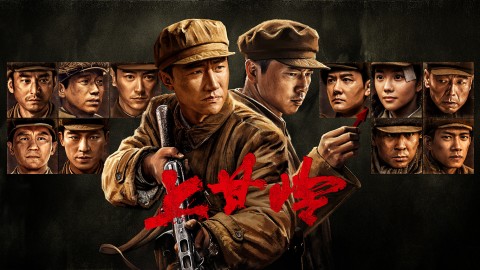Episode 25 recap: Wei Ruo Lai embarked on an adventure to deliver supplies to the front lines.
Shen Jin Zhen came to Qibao Street to help her neighbors evacuate. Wei Ruo Lai was worried for her safety and urged her to leave as soon as possible, but Shen Jin Zhen insisted on staying to help treat the wounded. The Japanese were burning, killing, and looting in the streets. Jiang Hu Hao and the rickshaw pullers bravely resisted, and Shen Tu Nan supported their actions wholeheartedly.
The Japanese frequently caused trouble in Shanghai, and a large-scale war was about to break out. Shen Tu Nan convened a meeting with the heads of the Shanghai Banking Union, urging them to indefinitely close their businesses to resist the Japanese. He also requested them to raise military funds for the 19th Route Army stationed in Shanghai. Yu Shi Qing made various excuses to evade the responsibility, believing that the Japanese would honor their promise not to wage war on the concessions. Shen Tu Nan remained resolute and unwavering in his stance.
As the sounds of cannon fire reverberated outside, Yu Shi Qing and others trembled in fear. Shen Tu Nan took the opportunity to propose a three-day bank strike as a protest and refused to back down on the issue of military funding. The Japanese bombed the Zhabei District relentlessly, causing numerous civilian casualties. Wei Ruo Lai, Zhou Yi, and Niu Chun Miao worked tirelessly to rescue the wounded. A Wen used a rickshaw to transport the injured to the hospital, which was already overcrowded. Wei Ruo Lai wanted to take surviving neighbors to the concessions temporarily, but Zhou Yi insisted on staying in Qibao Street to help the wounded.
Shen Jin Zhen brought a large quantity of first aid supplies and food, personally distributing them to the injured citizens and their families. She also gave Wei Ruo Lai a handgun for self-defense. The soldiers of the 19th Route Army rallied the citizens through broadcasts, calling for a joint resistance against the Japanese. The citizens were filled with fervor, and even the prisoners in the jail united against the common enemy, eagerly demanding to join the fight against Japan. Lin Qiao Song applied to participate in the war and formed a suicide squad with the prisoners.
Wei Ruo Lai and Shen Tu Nan arrived at the concessions and witnessed the displaced citizens. They felt deeply uneasy. Shen Tu Nan gathered a batch of supplies intending to send them to the 19th Route Army. However, due to the intense fighting, they were forced to temporarily stay at the harbor. Wei Ruo Lai volunteered to escort the supplies to the front lines, causing Shen Tu Nan to worry about his safety. Nevertheless, Wei Ruo Lai had made up his mind, and Shen Tu Nan repeatedly advised and instructed him.
Upon hearing that Wei Ruo Lai was delivering supplies to the front lines, Jiang Hu Hao and the rickshaw brothers volunteered to assist. Wei Ruo Lai was deeply moved. That night, Wei Ruo Lai and Jiang Hu Hao, along with their comrades, moved the supplies from the concession harbor, risking their lives to deliver them to Huajie. They encountered trouble with the Japanese along the way, leading to a fierce battle between the two sides.
Lin Qiao Song and the members of the suicide squad arrived in time to reinforce them, killing all the Japanese and providing cover for Wei Ruo Lai and others to reach the front lines. Zhou Yi rallied the neighbors on Qibao Street to wash clothes for the soldiers, working day and night without rest. Niu Chun Miao went through the streets and alleys to raise donations for the 19th Route Army.
Despite Shen Tu Nan's efforts to mobilize and raise funds from various sources, the funding for the war against Japan was still far from sufficient. Wei Ruo Lai suggested issuing war bonds, and Shen Tu Nan thought it was a good idea. However, the public lacked confidence in the government. The Ministry of Finance issued construction bonds and called on the citizens to subscribe, but the response was minimal. The Ministry of Finance ordered the Central Bank to issue eight million construction bonds. Shen Tu Nan held a mobilization meeting and publicly announced that he would personally guarantee the construction bonds through his speeches. He set an example by being the first to subscribe for one hundred thousand yuan, and others followed suit.
Mr. Song praised Shen Tu Nan's actions, and Shen Tu Nan wanted to manipulate the construction bonds in the stock market. Mr. Song supported his idea. Wen Biao recorded all the conversations between Shen Tu Nan and Mr. Song through listening devices and immediately handed them over to Kang Shao Jie.
On the first day of the issuance of the construction bonds in the stock market, the citizens rushed to buy them, and the bond prices soared. Shen Tu Nan observed everything and asked Wei Ruo Lai to call the heads of major banks, instructing them to attend a meeting at the Central Bank in the afternoon. The bank presidentsgathered at the Central Bank as instructed. Shen Tu Nan proposed a plan to stabilize the bond market and prevent speculation. He emphasized the importance of maintaining stability during the war and urged the bank presidents to cooperate. The bank presidents agreed to implement the plan and pledged their support.
However, Kang Shao Jie arrived at the meeting with evidence of Shen Tu Nan's manipulation of the construction bonds. He accused Shen Tu Nan of corruption and called for his immediate arrest. Shen Tu Nan was taken aback by the sudden turn of events but maintained his composure. He denied the accusations and demanded to see the evidence. Kang Shao Jie presented the recorded conversations between Shen Tu Nan and Mr. Song as proof of his wrongdoing.
Shen Tu Nan realized that he had been betrayed by Mr. Song and felt a deep sense of disappointment. He defended himself, stating that his actions were for the greater good of the country and the war effort. He argued that stabilizing the bond market was necessary to ensure the success of the war against Japan. However, Kang Shao Jie remained unmoved and insisted on Shen Tu Nan's arrest.
Wei Ruo Lai, who had been watching the events unfold, stepped forward and vouched for Shen Tu Nan's integrity and dedication to the cause. He argued that the war was at a critical stage, and removing Shen Tu Nan from his position would only hinder the ongoing efforts. Wei Ruo Lai pleaded with Kang Shao Jie to reconsider his decision and prioritize the nation's interests over personal vendettas.
Kang Shao Jie hesitated for a moment, considering Wei Ruo Lai's words. He acknowledged Shen Tu Nan's contributions but remained steadfast in his belief that corruption should not be tolerated. Kang Shao Jie proposed a compromise: Shen Tu Nan would be temporarily suspended from his position pending a thorough investigation into the allegations. If found innocent, he would be reinstated with full honors.
Shen Tu Nan accepted the compromise, recognizing that it was the best course of action given the circumstances. He thanked Wei Ruo Lai for his support and expressed his determination to clear his name. As Shen Tu Nan left the Central Bank, he vowed to fight for justice and continue his efforts to support the war against Japan.
Wei Ruo Lai returned to Qibao Street with a heavy heart, knowing that the man he respected and admired had been unfairly accused. He shared the news with Zhou Yi, Niu Chun Miao, and the others, who were equally shocked and saddened by the turn of events. They expressed their unwavering support for Shen Tu Nan and vowed to help him in any way they could.
The war against Japan raged on, and the citizens of Shanghai faced increasing hardships and dangers. Shen Jin Zhen continued her work as a nurse, tending to the wounded and providing comfort to those in need. Wei Ruo Lai joined the 19th Route Army, fighting alongside his comrades to defend their city and their country.
In the midst of the chaos and uncertainty, the people of Shanghai remained resilient and united in their determination to resist the Japanese aggression. They looked to leaders like Shen Tu Nan and Wei Ruo Lai for inspiration and guidance, hoping that justice would prevail and their sacrifices would not be in vain.
Zhou Yi bought two shares of the Construction Stock Coupons and immediately made a profit of thirty yuan. She hosted a grand banquet to celebrate with her neighbors. Jiang Hu Hao, A Wen, and others were eager to try their luck as well. Wei Ruo Lai had high hopes for the Construction Stock Coupons and supported them in taking action. The Japanese frequently caused trouble in Shanghai, and a major war was imminent.
Shen Tu Nan convened a meeting with the leaders of Shanghai's banking industry union, instructing them to suspend operations indefinitely to resist Japan. He also called for the collection of military funds for the 19th Route Army stationed in Shanghai. Yu Shi Qing made various excuses and believed that the Japanese would keep their promise not to launch a war on the concessions. Shen Tu Nan had a firm and unquestionable attitude.
As the sound of artillery roared outside, Yu Shi Qing and others were trembling in fear. Shen Tu Nan took the opportunity to propose a three-day strike by major banks as a protest and did not budge on the issue of military funds. The Japanese carried out intense bombings in the Zhabei District, resulting in numerous civilian casualties. Wei Ruo Lai, Zhou Yi, and Niu Chun Miao rushed to rescue the wounded. A Wen used a yellow cart to transport the injured to the hospital, which was already overcrowded. Wei Ruo Lai wanted to take surviving neighbors to the concessions for temporary shelter, but Zhou Yi insisted on staying on Qibao Street to help the wounded.
Shen Jin Zhen brought a large quantity of first aid supplies and food, personally distributing them to the injured citizens and their families. She gave Wei Ruo Lai a handgun for self-defense. The soldiers of the 19th Route Army called on the citizens through the radio to join the resistance against Japan, and the citizens were filled with enthusiasm. Even the prisoners in the jail were united in opposition and demanded to go out and fight the Japanese. Lin Qiao Song applied to participate in the war and formed a suicide squad with the prisoners.
Wei Ruo Lai and Shen Tu Nan arrived at the concessions and saw the displaced citizens. They felt uncomfortable about the situation. Shen Tu Nan raised a batch of supplies to be sent to the 19th Route Army, but due to the intense fighting, they were forced to stay temporarily at the port. Wei Ruo Lai voluntarily offered to escort the supplies to the front lines, causing Shen Tu Nan to worry about his safety. However, Wei Ruo Lai had made up his mind, and Shen Tu Nan repeatedly cautioned and instructed him.
When Jiang Hu Hao heard that Wei Ruo Lai was going to deliver supplies to the front lines, he and his yellow cart brothers volunteered to help. Wei Ruo Lai was deeply moved. That night, Wei Ruo Lai and Jiang Hu Hao, along with their brothers, moved the supplies from the concession port and risked their lives to deliver them to Huajie. They encountered trouble from the Japanese halfway, and a fierce fight broke out between the two sides.
Lin Qiao Song and his suicide squad arrived in time to provide reinforcements, killing all the Japanese and covering Wei Ruo Lai and the others to reach the front lines. Zhou Yi called on the neighbors to wash clothes for the soldiers. They tirelessly washed bandages day and night, while Niu Chun Miao roamed the streets and alleys to raise funds for the 19th Route Army.
Despite Shen Tu Nan's efforts and various fundraising activities, the funds for the war against Japan were still far from sufficient. Wei Ruo Lai suggested issuing war bonds, which Shen Tu Nan thought was a good idea. However, the public lacked confidence in the government. The soldiers of the 19th Route Army fought bravely and finally drove away the Japanese. A ceasefire agreement was signed between the two sides, and the citizens spread the news.
Shen Tu Nan saw the humiliating ceasefire agreement and was furious. Wei Ruo Lai thought of the neighbors who had worked hard for the resistance against Japan, and he felt very sad. The Ministry of Finance issued Construction Stock Coupons and called on the citizens to subscribe, but people were disappointed with the government, and there were very few subscribers. The Ministry of Finance issued eight million Construction Stock Coupons to the central bank. Shen Tu Nan held a mobilization meeting and publicly announced that the construction bonds would be used as collateral. He led by example and was the first to subscribe for one hundred thousand yuan. Others followed suit.
Mr. Song praised Shen Tu Nan's actions, and Shen Tu Nan wanted to control the Construction Stock Coupons. Mr. Song supported his idea. Wen Biao recorded all the conversations between Shen Tu Nan and Mr. Song using monitoring devices and immediately handed them over to Kang Shao Jie.
On the first day of the issuance of Construction Stock Coupons in the stock market, citizens rushed to buy them, and the stock price soared. Shen Tu Nan observed all of this. He asked Wei Ruo Laiabout his opinion on the situation.



Comments(Episode 25)